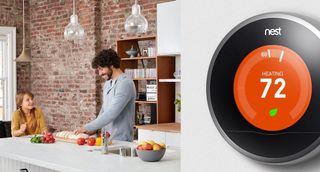Your Nest Learning Thermostat is about to not matter
Your Nest Learning Thermostat is about to not matter

At last week's Google Home Developers Briefing, Michele Turner, the Senior Director of Product Direction, talked virtually how Google would support Matter, a new standard that could unify every hereafter smart home device, no thing who makes it.
During her presentation, she highlighted all of the Google Nest devices that would support Affair, whether through built-in Thread radios or via Wi-Fi. Amongst the devices on the slide were the Google Nest Hub Max, Google Nest Hub (2nd gen), Nest Wifi, and the new Nest Thermostat.
Not shown: The Nest Learning Thermostat.
- The best smart thermostats for your home
- Black Friday deals: The best early sales now
- Just In: Samsung Galaxy S22 could look mode different than the S22 Ultra
Yes, the iconic device that launched Nest itself ten years ago — and remains one of the all-time smart thermostats, despite the hardware not changing in the last vi years — will not support the adjacent generation of smart abode interoperability, Google confirmed later.
For those unfamiliar, Matter is a new smart abode protocol being backed past Amazon, Google, Apple tree, and Samsung among others, which promises to brand it a lot easier for smart domicile devices to connect to one another. More importantly, it should simplify the installation of smart domicile devices and get them communicating, regardless of whether they're using Siri, Alexa, or Google Assistant.
Currently, there are a number of competing standards, including Zigbee, Z-Moving ridge, Bluetooth, and fifty-fifty to some extent, Amazon Sidewalk. In order to go a Zigbee device to talk to, say, a Z-Wave device, or to connect either to the deject, you lot'd demand a smart habitation hub.
Even and then, there are other compatibility bug — for example, none of Nest'south products piece of work natively with HomeKit, and Ring's cameras don't fully work with Google Home. While some of these issues are a result of competing companies not wanting to work with each other, some of it is also due to networking problems.
During its Developer's Briefing, Google said that it would be releasing new tools next yr to enable third-political party developers to work with Google Habitation and other Matter devices. This is practiced — Google lags far behind both Amazon and fifty-fifty HomeKit in what you can do with those devices in one case connected.
Allow'south apply the "Leaving Home" routine as an example. In Google Dwelling, if y'all want to trigger this routine, you either take to set a specific time, say a command to Google Assistant, or dismiss an alarm. In HomeKit, you tin trigger this result by the location of your phone, or if a smart home device is activated — such as locking your front end door or turning off the lights. You can also trigger an automation if a sensor detects something. For example, if my Ecobee smart thermostat senses motion, I tin accept HomeKit automatically turn the lights on in that room, and even specify when that action should occur.
It'due south much the aforementioned way with Alexa. I can create routines that not only don't need me to actively trigger them, but tin run themselves based on inputs from other devices in my business firm. Amazon tin can even create routines that utilize the sound of babies crying, dogs barking, coughing and snoring as triggers.
The next step for all smart home engineering science is what Dave Limp, Amazon's caput of hardware, calls "ambient intelligence," where your smart domicile devices can analyze your patterns and so propose actions based on what it thinks you might exercise.
It's less than perfect; only this morn, after I asked Alexa what the weather condition was like, she and so helpfully mentioned that my commute was going to be a bit slower today. Unless at that place's a traffic jam on the stairs to my attic office, I don't run across myself getting to piece of work any subsequently than usual.
"Context-driven intelligence and automation is the multiplier, and core to Google's unique strengths," said Turner during the keynote at the Google Home Developers Elevation. "Making homes more proactively helpful is the north star of our vision for the smart home."
And so, Matter promises a new time to come of smart dwelling house connectivity, but if you own the original Nest Thermostat, you'll have to upgrade it if you desire to take reward. It's a flake of a bummer — while we, as consumers, are trained to upgrade our smartphones, laptops, and TVs every few years (you don't take to do this, either), devices such as appliances and thermostats have a much longer replacement cycle. Chances are, if you install a thermostat, it's going to stay there for a good 20 years, if non longer. I'd be willing to bet that fifty-fifty if you have a first-generation Nest Learning Thermostat, which is a decade former at this point, information technology's probably still going strong.
My mom has a KitchenAid stand mixer that she got every bit a wedding nowadays 51 years ago; not only is it still going stiff, just it has arguably gained more abilities equally KitchenAid has released new attachments over the years.
It'south a testament to Nest that they have designed a product and so well, just the problem with electronics is the planned obsolescence. At some point, companies terminate supporting them and issuing updates to keep them performance.
While Google hasn't said anything officially, I would expect information technology to reveal an updated Nest Learning Thermostat some time next year that supports Matter; I bet a new Nest Protect smart smoke detector is on the horizon, also. I'yard besides reasonably confident that current Nest devices volition continue to role well into the futurity. It's simply a shame that they won't affair.
Source: https://www.tomsguide.com/news/your-nest-learning-thermostat-is-about-to-not-matter
Posted by: schoenrockbety1981.blogspot.com


0 Response to "Your Nest Learning Thermostat is about to not matter"
Post a Comment